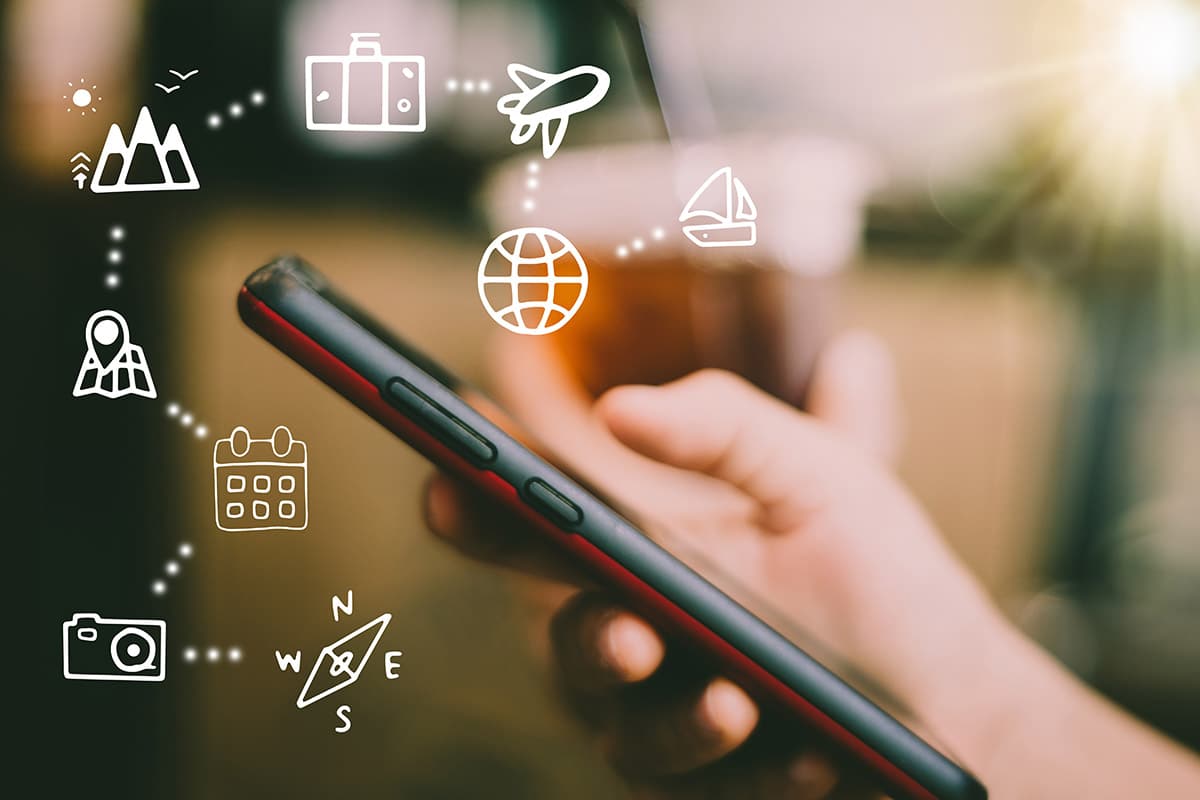In the dynamic landscape of travel and hospitality, businesses face the challenge of standing out in a fiercely competitive market. This blog explores innovative travel marketing strategies that attract attention and build lasting brand loyalty. By embracing digital transformation and understanding the modern traveler’s evolving preferences, companies can craft marketing campaigns that resonate deeply with their target audience, driving from awareness to conversion to loyal customers who will be repeat customers and brand evangelists.
Understanding the Modern Travel Consumer
Today’s travelers seek more than just a destination; they seek personalized, unique experiences that align with their values. This shift in consumer behavior calls for a nuanced approach to travel marketing rather than generic, one-size-fits-most advertising and marketing. Travel consumers seek everything from bespoke travel experiences to sustainable tourism to family vacations that incorporate activities for extended family members spanning multiple generations. To effectively engage with evolving audiences, travel marketers need to consider the following:
- Sustainable Tourism: An increasing number of travelers prioritize environmental impact, opting for eco-friendly accommodations and experiences that support local communities.
- Personalized Experiences: Customized travel itineraries that cater to individual interests, from culinary tours to adventure sports, are becoming the norm.
- Digital Convenience: Today’s tech-savvy travelers expect seamless online booking processes, real-time updates, and digital documentation
- Multigenerational Family Vacations: There’s a growing trend for family vacations that cater to multiple generations, requiring a variety of activities and accommodations to suit all ages. These vacations often focus on creating lasting memories through shared experiences that appeal to both young and older family members.
Understanding these key consumer trends allows travel and hospitality brands to craft more effective marketing strategies, directly addressing the desires and needs of their target audiences.
Embracing Digital Transformation in Travel Marketing
The digital era has revolutionized how travel brands engage with consumers, offering unprecedented opportunities for personalized marketing, broad reach, and interactive customer experiences. Chief Marketing Officers (CMOs) in the travel and hospitality sector must leverage digital transformation to stay competitive and meet the evolving demands of modern travelers.
- Integrated Digital Platforms: The foundation of digital transformation in travel marketing lies in integrating various digital platforms. From social media to mobile apps and AI-powered chatbots, providing a seamless, omnichannel experience is crucial. For instance, Marriott’s use of chatbots for customer service inquiries and bookings demonstrates how integrating digital tools can enhance customer satisfaction and operational efficiency.
- Advanced Analytics and Big Data: Utilizing big data and advanced analytics allows travel brands to gain deep insights into consumer behavior, preferences, and trends. By analyzing data from multiple sources, including social media interactions, booking patterns, and online reviews, CMOs can make informed decisions to tailor marketing strategies, optimize offerings, and improve ROI. Predictive analytics can also forecast future travel trends, enabling proactive strategy adjustments.
- Personalization at Scale: Digital platforms enable personalization at an unprecedented scale. Leveraging AI and machine learning algorithms, travel brands can deliver personalized content, recommendations, and offers to individual consumers, enhancing engagement and loyalty. For example, Expedia’s use of AI to provide personalized travel recommendations represents how technology can transform customer interactions into unique, customized experiences.
- Content Marketing and Storytelling: In the digital age, content is king. Engaging, high-quality content that tells a story can significantly increase brand visibility and customer engagement. Utilizing various formats, such as blogs, videos, and interactive web features, and distributing them across digital channels can captivate and inspire potential travelers. The key is to create content that resonates with the target audience’s desires and aspirations, driving them towards booking decisions.
- Influencer and User-Generated Content: Collaborating with influencers and leveraging user-generated content can amplify your brand’s reach and credibility. Travelers often look to peers and trusted influencers for authentic travel insights and recommendations. By partnering with influencers whose followers match your target demographic, you can tap into new audiences and foster trust through relatable content.
- Investment in Mobile Technology: With most travel-related searches and bookings made on mobile devices, optimizing for mobile is no longer optional. Mobile apps, responsive web design, and mobile-first marketing strategies are essential for engaging the modern traveler. Features such as mobile check-in, digital boarding passes, and real-time notifications enhance the customer experience, making travel more convenient and accessible.
- Leveraging AR and VR: Augmented reality (AR) and virtual reality (VR) are redefining how consumers interact with travel content. These technologies offer immersive experiences that can showcase destinations, accommodations, and experiences compellingly before booking. For instance, VR hotel tours can give potential guests a realistic stay preview, increasing confidence in their booking decisions.
The digital transformation in travel marketing is not just about adopting new technologies; it’s about reimagining how travel brands connect with consumers, deliver value, and create memorable experiences. As a CMO, embracing and integrating these digital trends into your marketing strategy is crucial for driving growth, enhancing customer engagement, and staying competitive in the ever-evolving travel industry.
____________
Crafting Compelling Content for Travel Audiences
Storytelling is a powerful tool in travel marketing, capable of evoking emotions and creating a connection with your audience, and connections create customers. When properly orchestrated, the travel industry is ripe with experiences that can easily feed your content strategy year-round. Travel marketing teams should consider the following:
- Sharing Authentic Experiences: Narratives about real travel adventures can inspire and engage potential travelers.
- Visual Storytelling: Use high-quality images and videos to bring destinations to life and spark wanderlust.
- User-Generated Content: Encourage customers to share their stories and experiences to add authenticity and trustworthiness to your brand.
Personalization: The Key to Customer Loyalty
Personalization has emerged as a critical differentiator in securing customer loyalty. For Chief Marketing Officers (CMOs), this means going beyond the standard offerings to deliver tailored experiences that resonate personally with each traveler. Personalization in this context is about leveraging data insights to create interactions and offers that feel bespoke to the individual, thereby fostering a deeper connection with the brand. Here’s how this can be achieved:
- Leveraging Data for Tailored Recommendations
Data analytics are pivotal in understanding each customer’s preferences, past behaviors, and potential desires. By analyzing booking histories, search patterns, and engagement metrics, travel brands can craft personalized recommendations that hit the mark. For instance, if customers frequently book beach vacations, sending them information on new coastal destinations or special deals on seaside resorts can spark their interest and encourage repeat bookings.
- Customized Communication Across Channels
Effective personalization extends to all forms of communication with the customer, from email marketing to social media interactions. Personalized emails that address customers by name, reference their past trips, and suggest relevant future travel opportunities can significantly enhance engagement. Similarly, retargeting ads that remind customers of the destinations they’ve shown interest in can keep the brand top of mind and nudge them towards making a booking.
- Dynamic Content and Real-Time Offers
The use of AI and machine learning allows for the dynamic customization of content and offers presented to customers. This might involve a website that changes its featured destinations based on the user’s browsing history or an app that sends real-time offers based on the customer’s location and preferences. Such real-time personalization enhances the user experience and increases the likelihood of conversion.
- Building Loyalty Through Personalized Experiences
Personalization’s ultimate goal is to create unique and satisfying experiences that customers cannot help but return. This includes everything from the booking process to the travel experience itself. Offering personalized travel itineraries, tailored in-flight options, and bespoke accommodation arrangements can significantly impact customer satisfaction and loyalty. Moreover, inviting customers to provide feedback and showing that their input shapes future offerings reinforces the feeling of being valued, encouraging long-term loyalty.
- Integration of Technology in Personalization
Emerging technologies such as chatbots for personalized customer service, IoT for enhanced in-stay experiences (e.g., personalized room settings), and AR/VR for immersive destination previews contribute to a more personalized and engaging customer journey. CMOs should be at the forefront of integrating these technologies to deliver memorable and unique travel experiences that keep customers returning.
Personalization is not just a marketing strategy but a comprehensive approach to customer engagement in the travel industry. By understanding and anticipating the needs and preferences of each traveler, brands can forge stronger connections, ensuring lasting loyalty and driving repeat business.















